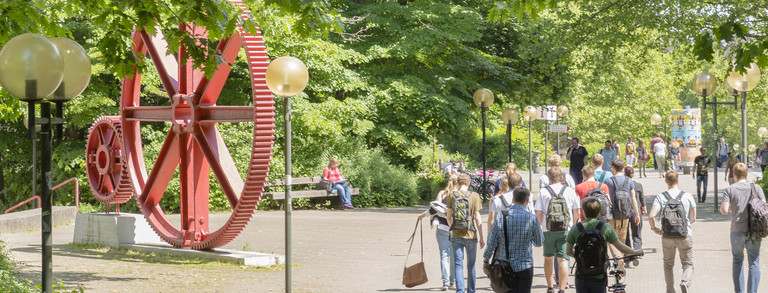Univ.Prof. Dr. Barbara Mertins

Emil-Figge-Str. 50
Room 3.109
Secretariat: (+49)231 755 5873
Office: (+49)231 755 2916
Office hours: Please contact Johannes Hochmann if you have any student concerns, such as making an appointment or questions in connection with certificates.
Main areas of work and research
BMBF-Project: BeeMEHR
Project management
Project information:
BeeMEHR – Warum Mehrsprachigkeit einfach mehr ist
psycholinguistics laboratories
Psycholinguistics
- Language and cognition
- Psycholinguistic foundations of learning (memory, conceptual preferences)
- Language pathology
- First & second language acquisition
- Bilingualism (esp. cognitive advantages, code-switching)
- Intellectual giftedness
- Spatial cognition
Methods of Experimental Linguistic
- Eye-tracking
- Experimental designs & methods
Contemporary linguistics
- Temporality research (esp. aspect & tense)
- Definiteness and specificity
- Lexicon
Current Announcements
- If you need a certificate of achievement, please contact Johannes Hochmann. (Email: johannes.hochmann@tu-dortmund.de)
- Since winter semester 2018/19, a new, joint MA course in Empirical Multilingualism Research has been offered at TU Dortmund University and RUB. For information see EMF website.
Next office hours
Consultation hours take place digitally and by appointment only!
Scientific practices and academic career
Since Nov. 2014 to present
Chair of Empirical and Experimental Linguistics of German - Psycholinguistics at TU Dortmund University, Faculty 15
Sept. 2014
Rejection of call to the University of Marburg: W2 professorship for DaF/DaZ
Dec. 2012
Habilitation with the thesis “Investigation on language and cognition using the example of event conceptualization and text coherence in German and Czech at the Faculty of Modern Languages at the Ruprecht-Karls University of Heidelberg. Venia legendi for the subject German Linguistics with special emphasis on Psycholinguistics
Nov. 2004
PhD in psycholinguistics with the PhD thesis completed concurrently with the topic of “The expression of simultaneity in learner varieties” at Max-Planck-Institut für Psycholinguistics & Radboud University Nijmegen
Dec. 1998
Master in linguistics, philosophy, and the recent German literature at Albert-Ludwigs-University in Freiburg in Breisgau with the research on “Context, Search Perspectives, and linguistic association activity”. An empirical work on the connection between schizophrenia and language processing.
Sept. 1993
- July 1998
Bachelor in German Studies ( specialization in neuro-linguistics), philosophy, the recent German literature at Albert-Ludwigs-University in Freiburg in Breisgau
Oct. 1992
- June 1993
Education in the German Studies and the Bohemian studies at Charles University in Prague
Awards/ Prizes / Scholarships
2023
Gerda Henkel Fellowship, Guest professor in the Visiting Professor Series in German Studies; Stanford University
2019
Nomination through the students of German studies of faculty 15 for the Ars-Legendi-Prize for the excellent and research-based lecturer
2017
IDE Award for outstanding inclusion teaching
2014
Erasmus-Mundus research scholarship for the university of Haifa, Israel
2010-2011
Annual research scholarship; Center of Advanced Study, Oslo
2010
Nomination through IDF student council for the Ars-Legendi Prize for excellent university teaching
2009 & 2010
Each is a one-week residency scholarship from Charles University Prague.
2008-2009
Participation in the management program on the way to a professorship in the Excellence Initiative at Heidelberg University
2007
Klaus-Georg und Sigrid Hengstberger-Prize for the promotion of the best young scientists at Heidelberg University
1999-2004
MPG PhD scholarship at Max-Planck-Institute for Psycholinguistics
1995-1996
DAAD-Scholarship at the Albert-Ludwigs-University, Freiburg
The website of the psycholinguistics laboratories under the direction of Prof. Dr. Mertins can be found here:
div.kuwi.tu-dortmund.de/forschung/psycholinguistics-laboratories/
Linguistic relativity
- bilingual first language acquisition of conceptual preferences
- grammatical gender
- movement events
Space and cognition
- Differences in spatial cognition between experts and non-experts (together with Chair of Building Construction, Faculty 10)
- The role of gender in spatial cognition
- The role of language-specific differences in spatial cognition
Speech pathology
- Language processing in Alzheimer's dementia
- Language and space in WBS and Down syndrome
Further projects
- Children's University at TU Dortmund University
- Adam's Corner
The project "Wrestling with Language" approaches the topic of language and multilingualism in a new interdisciplinary context. Three forms of expression meet here: Science, dance and choreography as well as the visual arts. The aim is to enable participants to express their thoughts, knowledge and feelings on the subject in an artistic/performative way. The resulting video can be found at the following link:
Guidelines on the procedure for BLS examinations
Download the handout on BLS examinations
BA- and MA Dissertations
Suggested topics for BA- and MA Dissertations
Please discuss the selected or planned topics of your dissertations during my consultation hours. I aim to integrate all the BA- and MA dissertations into my current research projects.
From now on, students who are writing an empirically based qualification dissertation with Prof. Dr. Mertins have access to various recording devices (video and audio) and microphones.
Download the BA- und MA-Topics
Information on the written and oral concept as module completion in MLS 1, MLS 2 and ASL
Information on these module examinations can be found in the following documents:
MLS
Information on the oral concept
Information on the written concept
ASL
Information on the final module
Professional internship in German studies
Editor (together with Tanja Rinker and Sung-Eun Lee) of COGNITIO: Cognitive and Neuroscientific Contributions to Natural Language Processing (published by Peter Lang Verlag).
Since 2023 Prof. Mertins has been co-editor of the magazine Schnittstelle Germanistik.
Since 2023 Prof. Mertins has been associate editor of the magazine Psychology of Language and Communication.
Since 2020 Prof. Mertins has been part of the editorial board of the journal Open Slavic Linguistics.
2026
- Panfilova, E. & Mertins, B.: Exploring time-telling expressions: A cross-linguistic study of German, Czech, and Russian. In: Linguistik Online, 142 (1), 2026, S. 41–62.
- Odermann, K. & Mertins, B. (2026): Semantic awareness in preschool children: How bilingualism enhances metalinguistic knowledge. In: Zeitschrift für Erziehungswissenschaft.
2025
- Fatemi, M., Mertins, B. & Schroeder, V.: The influence of grammatical gender on cognition: the case of German and Farsi. In: Open Linguistics 1 (11), 2025. https://doi.org/10.1515/opli-2025-0071
- Delucchi Danhier, R., Mertins, B., Mertins, H. & Schneider, G. 2025. Entropy as a Lens: Exploring Visual Behavior Patterns in Architects" Journal of Eye Movement Research 18 (43), 2025. https://doi.org/10.3390/jemr18050043
- Mertins, B.: Vývoj jazyka nejmenších kontra mobil rodičů (Deutsch: Entwicklung der Sprache der Kleinsten kontra das Handy der Eltern). In Vesmír 104, Jan. 2025, S. 12.
2024
- Mertins, B.: Rezension: Museum lyžování – Museum des Skifahrens. Dolní Branná, Podkrkonoší. Ausstellung über die Geschichte des weißen Sports im Riesengebirge. In: Schnittstelle Germanistik, 4 (2), 2024, S. 197–200.
- Mertins, B.: Viktorie Hanišová: Houbařka [Die Pilzsammlerin]. Brno: Host, 2021, 309 Seiten. In Karlsuniversität, Fakultät der Künste (Hrsg.): Brücken. Zeitschrift für Sprach-, Literatur- und Kulturwissenschaft, 2 (31), 2024, S. 165–166.
- Mertins, B., Alipaß, J. & Odermann, K.: Mehrsprachigkeit in der deutschen Schule: Der Einfluss der eigenen Vorurteile von Lehrkräften auf den Schulerfolg der SchülerInnen mit dem sogenannten „Migrationshintergrund“. In: Journal of Elementary Education, 17, S. 81–100.
- Huang, H., Doebler, P & Mertins, B.: Short‑time AOIs‑based representative scanpath identification and scanpath aggregation. Behav Res.
- Andresen, H., Delucci, R. & Mertins, B.: Dominant-while-speaking: How bilingual Norwegian–English children conceptualize goal-oriented motion events. In: International Journal of Bilingualism (Online first).
2023
- Mertins, B.: Eine Reise in die Vergangenheit, die in der Gegenwart immer noch wirkt. Die Lebensgeschichte von Emmerich Rath aus linguistisch-kultureller Perspektive. In: Schnittstelle Germanistik, 3 (2), 2023.
- Marklová, A. & Mertins, B.: Expression and Perception of Endpoints during Language Acquisition: Three Studies on Czech. In SALI, (14) 2, S. 7-29.
- Mertins, B: Mökke essen. Das tut nicht nur dem Großvater gut! Dialekte und sprachliche Varietäten im Spiegel der Mehrsprachigkeit. In: Leskau, L. & Nieberle, S. (Hgg.): Wiedersehen mit Heidi. Polyperspektivische Lektüren der Heidi-Romane von Johanna Spyri. Reihe: Diversity in Culture. Bielefeld: transcript Verlag, S. 257-267.
- Mertins, B. & Delucchi Dahnier, R.: Diversity in Cognition. Bern u.a.: Peter Lang Verlag.
- Marklová, A., Panfilova, E. & Mertins, B. Description of locomotion events: Language-specific patterns in child-directed speech. In WORD, 70, S. 339-361. DOI: 10.1080/00437956.2023.2269702.
- Mertins, B., Leimbrink, K., Lipavic Oštir, A.: Mehrsprachigkeit in deutschsprachigen Kontexten. In: Schnittstelle Germanistik, 3 (1), 2023.
- Mertins, B.: Deutsch im Kontext im mitteleuropäischen und osteuropäischen Sprachraum: Soziolinguistische und historische Bedingungen des Sprachkontakts. In: Schnittstelle Germanistik, 3 (1), 2023, S. 95-120.
- Mertins, B.: Sprache und Identität. In: Höfer, H., Delere, M., Vogel-Lefèbre, T. (Hgg.): Bildung, Diversität und Medien. Erkundungen entlang aktueller Diskurslinien. München: Kopaed, S. 167-177.
- Welzel, Barbara & Kreutchen, Christopher: Kulturelle Teilhabe - Standortbestimmungen zwischen Mehrsprachigkeit und Inklusion, Raum und Verortung, Ort und Ortlosigkeit, Bildern und Objekten, Vulnerabilität und Würde. In: Hußmann, Stephan; Welzel, Barbara (Hgg.): DoProfil 2.0 - Das Dortmunder Profil für inklusionsorientierte Lehrerinnen- und Lehrerbildung (S. 55-131), 2023. Münster: Waxmann
2022
- Mertins, B. & Ronan, P. (Hgg.): ankommen//angekommen (verorten: Räume kultureller Teilhabe, hrsg. von Kreutchen, Ch. & Welzel, B.). Dortmund: Athena Verlag. Rezension
- Mertins, B. & Delucchi, R.: Warum Mehrsprachigkeit einfach mehr ist: Die Rolle von individuellen Überzeugungen im Mehrsprachigkeitsdiskurs. Mertins, B. & Ronan, P. (Hgg.): ankommen//angekommen. Dortmund: Athena Verlag, S. 41-55.
- Mertins, B.: Auf den Spuren zu sich selbst. In: Ballhorn, Egbert; Neuhäuser, Christian; Welzel, Barbara (Hgg.): Inkarnation // Dekarnation (S. 33 - 42), 2022. Reihe: Kreutchen, Christopher; Welzel, Barbara (Hgg.) (2022): verorten - Räume kultureller Teilhabe. Bielefeld: ATHENA wbv
- Mertins, B.: Diversitätsdialoge im Licht des Schwellenkonzepts. In: Gurdon, Alexander; Hübscher, Sarah; Kreutchen, Christopher (Hgg.): Resonanzen // Interventionen (S. 90-97), 2022. Reihe: Kreutchen, Christopher; Welzel, Barbara (Hgg.) (2022): verorten - Räume kultureller Teilhabe. Bielefeld: ATHENA wbv
2021
- Mertins, B.: Teilhabe. In Contactzone – Ein Prinzip der guten Nachbarschaft. Festschrift für Barbara Welzel. Hübscher, S. & Kreutchen, Ch. Dortmund: Kettler Verlag, S. 62-67.
- Mertins, B.: On the interpretation of possessives in Czech: An experimental approach. In: Fabricius-Hansen, C. (ed.): Resolving Possessive Puzzles, Oslo Studies in Language 12(2), 2021, p. 97-125
- Stadler, M., Doebler, P., Mertins, B. & Delucchi Danhier, R.: Statistical modeling of dynamic eye-tracking experiments: Relative importance of visual stimulus elements for gaze behavior in the multi-group case. In: Behavior Research methods (2021)
- Dröse, J., Prediger, S., Neugebauer, P., Delucchi Danhier, R., & Mertins, B.: Investigating Students’ Processes of Noticing and Interpreting Syntactic Language Features in Word Problem Solving through Eye-Tracking. In: International Electronic Journal of Mathematics Education, 16(1)
2020
- Mertins, Barbara. Dvojjazyčnost prospívá výkonu mozku (Deutsch: Zweisprachigkeit kommt der Gehirnleistung zugute). In Vesmír 99, Okt. 2020, S. 584-585
- Mertins, Barbara: Der Geist des 17. November 1989. In Sudetenland, 4 2019, 61. Jahrgang, S. 441-444
- Mertins, H., Delucchi Danhier, R., Mertins, B., Schulz, A., Schulz, B.: The Role of Expertise in the Perception of Architectural Space. In Leopold, C., Robeller, C., Weber, U. (Hrsg.) Research Culture in Architecture. Basel: Birkhäuser. 279-288.
- Mertins, Barbara. Je myšlení závislé na jazyku? (Deutsch: Ist Denken abhängig von Sprache?). In Vesmír 99, S. 208-209
2019
- Vanek, N. & Mertins, B.: V. Defying chronology: : Crosslinguistic variation in reverse order reports. In Linguistics, S. 1-35.
- Delucchi Danhier, R., Neugebauer, J., Dröse, S., Prediger, S., Mertins, B.: Eye-Tracking Studie zum Erfassen von Referenzstrukturen in Textaufgaben der Klasse 5. In Frank, A., Krauss, S & Binder, K. (Hrsg.) Beiträge zum Mathematikunterricht 2019. Münster: WTM-Verlag. S. 1239-1242
2018
- Mertins, B., Delucchi Danhier, R., Wulf, J., Mertins, H. Gendertypische Raumwahrnehmung
- Mertins, B. Sprache und Kognition. Ereigniskonzeptualisierung im Deutschen und Tschechischen. Berlin/Boston: De Gruyter.
- Ackermann, L., Delucchi Danhier, R., Heiderich, S., Hußmann, S. & Mertins, B. Begabung in Sprache und Mathematik relational testen (Be_SMart). Wahrnehmungsmuster und Strategien begabter Schülerinnen und Schüler aus psycholinguistischer und mathematikdidaktischer Perspektive. In Hußmann, S. & Welzel, B. (Hrsg.) DoProfiL - Das Dortmunder Profil für inklusionsorientierte Lehrerinnen- und Lehrerbildung. Münster: Waxmann, 141-159.
- Delucchi Danhier, R. & Mertins, B. Psycholinguistische Grundlagen der Inklusion. Schwerpunkt Bilingualismus. In Hußmann, S. & Welzel, B. (Hrsg.) DoProfiL - Das Dortmunder Profil für inklusionsorientierte Lehrerinnen- und Lehrerbildung. Münster: Waxmann, 161-178.
- Bartz, J., Delucchi Danhier, R., Mertins, B., Schüppel, K. C., Welzel, B. & Zimenkova, T. Auf dem Weg zur Neuverortung: Sprache, Objektkultur und Religion im transkulturellen Deutschland. In Hußmann, S. & Welzel, B. (Hrsg.) DoProfiL - Das Dortmunder Profil für inklusionsorientierte Lehrerinnen- und Lehrerbildung. Münster: Waxmann, 179-194.
2017
2016
- Mertins, B. The use of experimental methods in linguistic research: advantages, problems and possible pitfalls. In Anstatt, T., Clasmeier, C. & A. Gattnar (eds..): Slavic languages in Psycholinguistics. Chances and Challenges for Empirical and Experimental Research. Tübingen: Narr Francke Attempto, 15-33.
- Delucchi Danhier R. & Mertins, B. Language-specific information structure in German and Spanish route directions In International Journal of Applied Linguistics, VIAL, 13, 55-92.
2015
2014
- Klein, Ch., Betz, J., Hirschbuehl, M., Fuchs, C., Schmiedtova, B., Engelbrecht, M., Mueller-Paul, J., Rosenberg, R. Describing Art – An Interdisciplinary Approach to the Effects of Speaking on Gaze Movements during the Beholding of Paintings. In Plos One, DOI:10.1371/ journal.pone. 0102439, 1-18.
- Behrens, B., Mertins, B., Fabricius-Hansen, C., Hemforth, B. Understanding coordinate clauses in Czech, English, German, and Norwegian. In Hemforth, B., Mertins, B., Fabricius-Hansen, C.(eds.) Studies in theoretical psycholinguistics, Cham u.a.: Springer Verlag, 1-22.
- Borthen, K., Hemforth, B., Mertins, B., Behrens, B., Fabricius-Hansen, C. Referring expressions in speech reports. In Hemforth, B., Mertins, B., Fabricius-Hansen, C.(eds.) Studies in theoretical psycholinguistics, Cham u.a.: Springer Verlag, 111-142.
- Hemforth, B., Mertins, B., Fabricius-Hansen, C.(eds.) Psycholinguistic approaches to meaning and understanding across language. Cham u.a.: Springer Verlag.
- Flanderková, E., Mertins. B., Bezdíček, O., Baborová, E., Černá, M. Posuzování gramatičnosti v Brocově afázii příklad dvou pacientů (Grammaticality Judgement in Broca’s Aphasia – Two Patients’s Study). In Česká a slovenská neurologie a neurochirurgie (Czech and Slovak Neurology and Neurosurgery) 77/ 110 (2), 202-209.
- Kadlecová, A., Nagy, M., Mertins, B., Donevská, S. Identifikace konstituentů kompozit u předškolních dětí (Identification of compound constituents in Czech preschool children). In Naše řeč, 97 (3), 146-165.
2013
- Schmiedtová, B. Traces of L1-patterns in the event construal of Czech advanced speakers of L2-English and L2- German. In IRAL (51), special issue, v. Stutterheim, Ch.,Flecken, M., Carroll, M. (eds.), 87-116.
- Schmiedtová, B. Zur Verwendung der perfektiven Präsensform im heutigen Tschechisch. In Journal for Central European Studies, special issue, Paliga, S. (ed.), Editura Universității București, 125-164.
- Schmiedtová, B. & Flanderková, E. Produkce řeči v afázii: kazuistika [Language production in aphasia: a Czech case study]. In Studie z aplikované lingvistiky (Studies in Applied Linguistics), 53-70.
- Schmiedtová, B. Zum Einfluss des Deutschen auf das Tschechische: Die Effekte des Zeitdrucks auf die Sprachproduktion. In M. Nekula, K. Šíchová & J. Valdrová (eds.). Bilingualer Sprachvergleich und Typologie. Tübingen: Julius Groos Verlag, 177-206.
2012
- v. Stutterheim, Ch., Andermann, M., Carroll, M., Flecken, M., Schmiedtová, B. How grammaticized concepts shape event conceptualization in language production: Insights from linguistic analysis, eye tracking data and memory performance In Linguistics, 4, 833-867.
- Schmiedtová, B. Fünf Einträge für den Bereich kognitive Linguistik (Aspekt, telisch, atelisch, perfektiv, imperfektiv). In H.B. Wiegand & S. Schierholz (eds.) Wörterbücher zur Sprach- und Kommunikationswissenschaft.
- Schmiedtová, B. Das tschechische enzyklopädische Wörterbuch – zwei Einträge: Methoden der Psycholinguistik; Zweitspracherwerb.
- Schmiedtová, B. & Sahonenko, N. Acquisition of L2 narrative competence: Tense switching by Russian L2 speakers of German, In Journal of Slavic Linguistics, 20, 1, 35-70.
- Schmiedtová, B. & Flanderková, E. Neurolingvistika: předmět, historie, metody [Neurolinguistics: subject, history, methods]. In Slovo a Slovesnost, 73, 46-62.
- Schmiedtová, B. Vergleich von deutschen und tschechischen kunsthistorischen Texten. In S. Höhne et al. (eds.). brücken. Germanistisches Jahrbuch Tschechien – Slowakei; thematischer Schwerpunkt – Sprachwissenschaft. Praha: Lidové Noviny, 221-240.
2011
- Schmiedtová, B. Do L2 speakers think in the L1 when speaking in the L2? In International Journal of Applied Linguistics, VIAL, 8, 97-122.
- Schmiedtová, B. Vidová morfologie českého slovesa (François Esvan - Rezension) [Aspect morphology in the Czech; Book review]. In Časopis pro moderní filologii, 125-126.
- Schmiedtová, B. Wie Sprache unser Denken formt - psycholinguistische Hintergründe. In S. Schulte (Ed.). Ohne Wort keine Vernunft – keine Welt. Bestimmt Sprache Denken? Schriftsteller und Wissenschaftler im Wortwechsel mit Johann Georg Hamann. Münster et al.: Waxmann Verlag, 97-128.
- Schmiedtová, B., v. Stutterheim, Ch., Carroll, M. Implications of language-specificpatterns in event construal of advanced L2 speakers. In A. Pavlenko (Ed.). Thinking and Speaking in two languages. Clevendon: Multilingual Matters, 66-107.
2010
2008
- Schmiedtová, B. & Sahonenko, N. Die Rolle des grammatischen Aspekts in Ereignis-Enkodierung: Ein Vergleich zwischen Tschechischen und Russischen Lernern des Deutschen. In P. Gommes & M. Walter (eds.). Fortgeschrittene Lernervarietäten: Korpuslinguistik und Zweitspracherwerbforschung. Tübingen: Max-Niemeyer-Verlag, 45-71.
- Schmiedtová, B. & Flecken, M. Aspectual concepts across languages: Some considerations for second language learning In Pedagogical Grammar S. de Knop & T. de Rycker (eds.). Mouton de Gruyter, Berlin, 357-384.
2007
2006
- Schmiedtová, V. & Schmiedtová, B. Určení jazykové základovosti barev v Českém národním korpusu. In Korpusová lingvistika: stav a modelové přístupy. F. Čermák & R. Blatná (eds.), Lidové noviny, Praha, 285-313.
2004
- Schmiedtová, B. At the same time: The Expression of simultaneity in learner varieties. Berlin, Mouton de Gruyter.
Here you can find all information about the BeeMEHR project
https://beemehr.kuwi.tu-dortmund.de/
Multilingualism is a human right - a manifesto in 4 chapters:
Youtube: Multilingualism is a human right
The importance of linguistic input for language acquisition in early childhood:
The importance of linguistic input
Methods in the Babylab - The head-turn preference method
The head-turn preference method
Podcast: ZEIT Wissen. Woher weißt du das? Wie Fremdsprachen dich verändern.
Podcast
Arte: 42. Die Antwort auf fast alles. Wie stark prägt die Muttersprache?
Zur Sendung
The link to the YouTube channel of psycholinguistics laboratories with videos on multilingualism and more:
YouTube channel of the psycholinguistics laboratories
The Instagram Account of the psycholinguistic laboratories
psycholinguistics_laboratories
The X Channel of the psycholinguistics laboratories
@pl_laboratories
Language as gravitation - Trailer of the psycholinguistics laboratories - TU Dortmund University
Trailer der psycholinguistics laboratories auf YouTube
Wrestling with language- an interdisciplinary project about multilingualism
Wrestling with language on YouTube
Inaugural lecture on January 15, 2016
Inaugural lecture of Prof. Dr. Barbara Mertins at TU Dortmund University on January 16, 2016, on YouTube
Teaching
Introduction to the methods and approaches of linguistics
Lecture
This lecture will provide an initial insight into the various methods of empirical and experimental linguistics. In addition, principles of good scientific practice will be explained and repeatedly addressed in the course of the lecture and their relevance will be illustrated using examples from research. Qualitative and quantitative methods of data analysis as well as typical approaches to language production and reception research will be discussed. The focus of the lecture will be on psycho- and neurolinguistic methods.
Taking a closer look at multilingualism
Seminar
The aim of this lecture is to convey important findings from current research on multilingualism. To this end, basic terminology will be clarified and key questions from the field of bi-/multilingual language processing will be addressed and answered on the basis of empirical findings. In addition, the course will draw parallels to the social relevance of multilingualism at many points. It is therefore aimed at anyone who wants to dispel the still widespread prejudices, misconceptions, and myths and replace them with sound knowledge.
Research colloquium: think outside the box
Seminar
The research colloquium aims to bring together advanced students interested in new insights into a discussion space where the latest research topics are discussed from multiple perspectives. This semester, the colloquium once again offers participants the opportunity to look beyond their own horizons, with colleagues from both neighboring and very distant disciplines enriching the round with lectures and subsequent discussions. The format of the colloquium is thus a mixture of intensive text work on selected psycholinguistic topics and guest lectures by invited experts from various disciplines.





